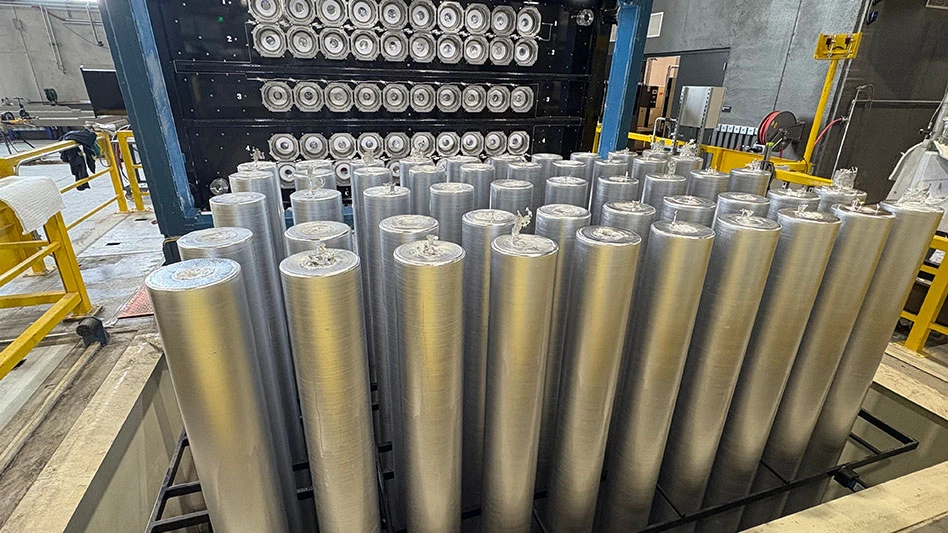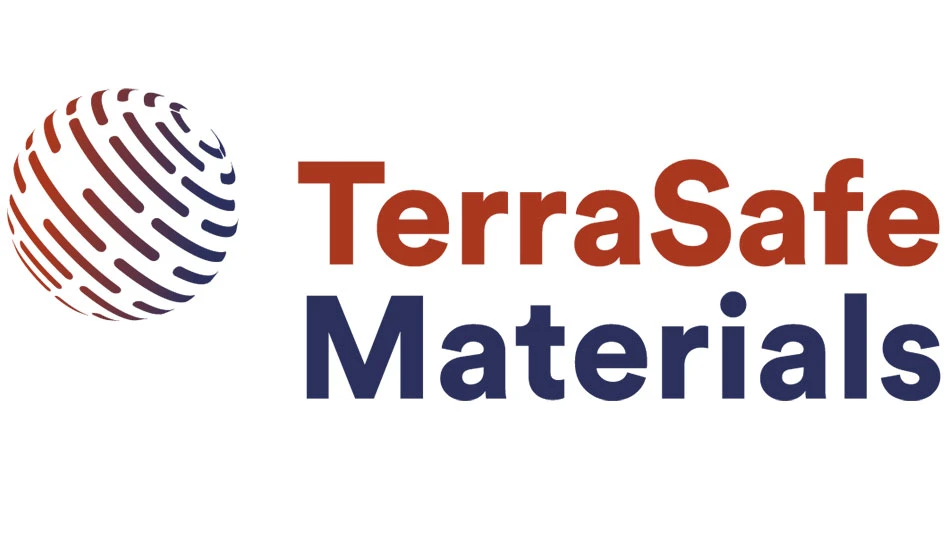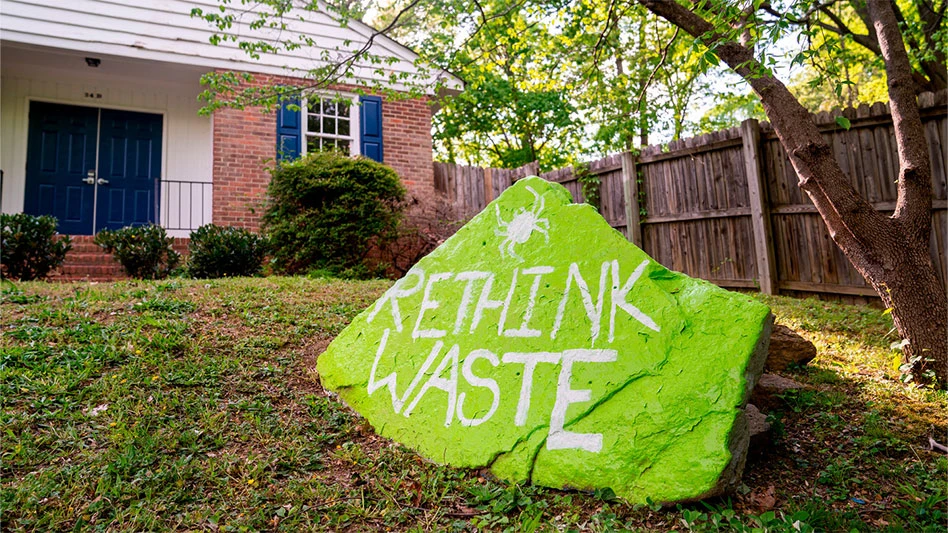
(Photo: Emmanuel Nyaletey speaking at the 2018 International Electronics Recycling Conference [IERC] in Salzburg, Austria. Photo courtesy of ICM AG.)
Electronics recycling practices can be among the fastest-changing in the recycling industry. Factors that can cause sudden changes in methodology include rapid shifts and upgrades in technology, volatility in precious metals prices and new policies at the state, national or even global level.
Beyond those factors, OEMs (original equipment manufacturers) and retailers can change their level of interest in or support of recycling efforts, quickly disrupting the supply or demand side of the waste electrical and electronic equipment (WEEE) equation in different ways.
In 2018 and beyond, circumstances influencing how electronics recyclers handle material will continue to shift, prompting constant reevaluation of whether to resell, partially dismantle or quickly shred what arrives at the loading bay.
Border crossings
Protectionism and trade issues have been predominant throughout the recycling industry in 2017 and so far in 2018, an aspect of doing business that is nothing new for electronics recyclers.
An overarching policy affecting electronic scrap involves the Basel Convention agreement by Organization of Economic Cooperation and Development (OECD) nations to prohibit non-working e-scrap from being exported to non-OECD nations.
The agreement was a response to the establishment of computer dismantling operations in China and other nations that put worker health and safety at risk and caused air and water pollution. The computer equipment being dismantled often was found to have been shipped from the United States and other OECD nations.
The problem was particularly acute when it involved cathode-ray tube (CRT) monitors, devices with large amounts of lead that in earlier decades were the display monitor of choice for both TV viewers and office computer users.
Nongovernmental organizations (NGOs) such as Greenpeace and the aptly named Basel Action Network (BAN) have focused attention on enforcement of the Basel Convention agreement. Among BAN’s tactics has been to place tracking devices into non-working pieces of computer equipment to find out whether U.S. or Europe-based recyclers were skirting the policy.
The Basel Convention was ratified in 1989 and subject to enforcement starting in 1992. Among the pitfalls of the agreement for recyclers and enforcement agencies alike is that almost nothing manufactured by OEMs in the computer, home entertainment or telecom sectors in 2018 was found in the obsolete electronics stream of 1989.
Another criticism of the policy comes from recyclers who question whether OECD nations have put themselves in a paternalistic position by implying that people in non-OECD nations (which largely are in Asia and Africa) cannot be entrusted to repair and remarket WEEE materials competently.
The issue is a critical one to Robin Ingenthron, the owner of Good Point Recycling in Vermont and co-founder of the Fair Trade Recycling Association (formerly called the WR3A). Ingenthron says his own travels and business experience has caused him to question whether harsh enforcement of the Basel Convention is the proper way to engage with the technology sector in developing nations. He also says the document has always offered an exemption for repair activities and safely managed hand disassembly recycling techniques.
Ingenthron has spent time with electronics refurbishment entrepreneurs in Mexico, Ghana and other nations and says he has incorporated some of their pioneering methods into his operation in Vermont.
Question marks surrounding electronic scrap exporting, however, continue to linger, based in part on stockpiles of nonworking computer, telecom and home entertainment devices found in Ghana and other non-OECD nations.
While Ingenthron says his own research has led him to conclude that in Ghana these devices have been discarded by local residents and businesses (rather than imported from Europe or the U.S.), the stockpiling points to another problem: the lack of a comprehensive waste management and materials recycling infrastructure in such nations was part or the reason for the Basel Convention in the first place.
NGOs such as BAN have shown few signs of backing off from their “no exports” viewpoint. In 2015, one of BAN’s tracking devices was installed in a non-working desktop printer that the NGO says left Ingenthron’s Good Point Recycling and eventually, via another recycler in Chicago, journeyed on a container ship to Hong Kong.
Although Hong Kong’s per capita GDP ranks it as wealthier than 21 of the 35 OECD nations, it is not part of the OECD and thus should not receive such units, per the Basel Convention. Historically, Hong Kong also has acted as a point of entry for e-scrap to then be shipped to less developed regions of Asia.
Problem or progress?
In a presentation at the 2018 International Electronics Recycling Conference (IERC) in Salzburg, Austria, in January, Emmanuel Nyaletey of Ghana stated, “Writing rules for the sale of used electronics to Africa without consulting Africa’s tech sector is like writing health codes without ever speaking to a doctor.”
Nyaletey, who is currently a computer science student at Georgia Tech in Atlanta, spent four years working for Ingenthron at Good Point Recycling in Vermont.
According to Ingenthron, from 2005 to 2015, as NGOs were lobbying for increased Basel Convention enforcement on exported e-scrap, “a funny thing was happening.” He comments, “Along the way, emerging markets gained higher household ownership of TVs than the U.S., according to World Bank statistics. Internet access became nearly ubiquitous across Africa [and] since independence [in 1957], Ghana’s GPD has increased from $210 per capita to $8,650 per person.”
States Ingenthron, “Despite multiple World Bank and IMF (International Monetary Fund) reports describing the way that used electronics had created ‘a critical mass of users’ for investors in cell phone and TV towers, satellites and cable TV [in Africa], the ‘white guilt’ angle was hard to resist.”
Ingenthron says NGO descriptions of OECD nations shipping 80 to 90 percent of their “worthless” e-scrap to developing nations has no sound statistical basis. He acknowledges, though, that in some shipments, from 20 to 30 percent of the units being shipped could be non-working.
Nyaletey and Ingenthron say WR3A is not opposed to additional testing protocols for export shipments, but that the receiving parties should have a voice when such protocols are designed. “Banning trade with emerging markets compounds the ignorance” that already exists about the sector, according to Ingenthron.
In Hong Kong, that city’s position as a bridge between the two worlds is one reason why additional electronic scrap processing capacity is being installed there in 2018.
Germany-based Alba Group has entered into a partnership with Hong Kong-based Integrated Solid Waste to operate a large-volume, highly automated WEEE materials shredding plant expected to come online in the first half of 2018.
Just a few miles away, Hong Kong-based Chiho Environmental Group also is setting up an electronic scrap processing facility that includes a refurbishment and dismantling operation as well as a shredding plant. The two facilities join an already robust electronic scrap resale, dismantling and recycling sector in Hong Kong.
Whether considered as a North American market or a global one, the appetite for affordable, refurbished equipment (and working components that can extend products’ lives) is unlikely to recede anytime soon.
Get curated news on YOUR industry.
Enter your email to receive our newsletters.
Latest from Recycling Today
- European Commission drafts new rules for chemically-recycled content in plastic bottles
- Redwood Materials launches Redwood Energy
- Cirba Solutions announces new human resources executive
- Cascades to close packaging site in Niagara Falls, New York
- The Glass Recycling Foundation awards $137K in grants
- Goodwill Industries of Ontario Great Lakes and Rotogran International announce collaboration
- Textile Recycling Expo USA launches in Charlotte, North Carolina
- SSAB trials using crumb rubber from scrap tires in steelmaking





